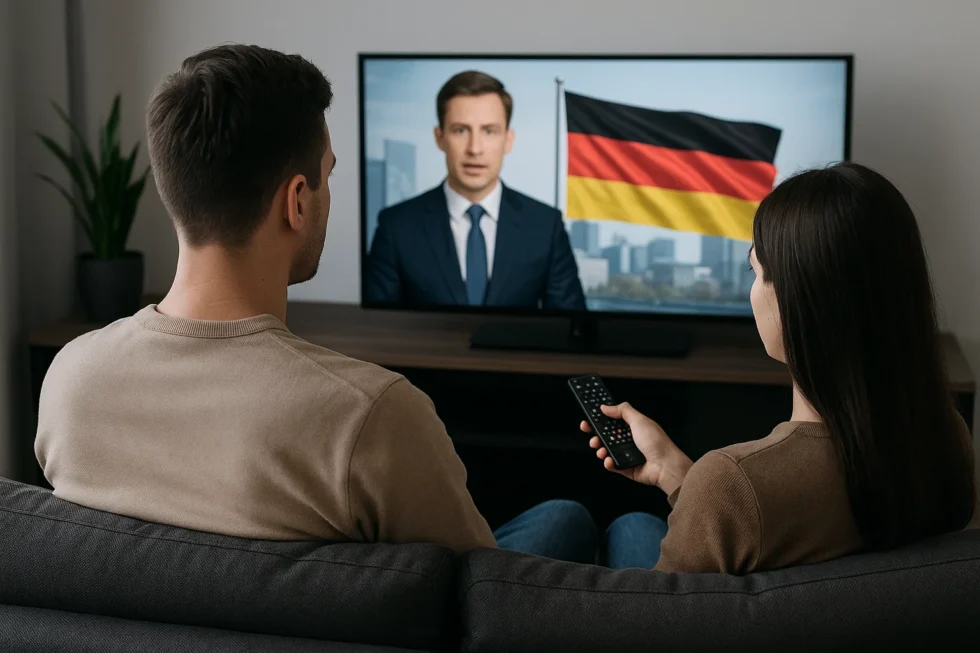What is IPTV and how waipu.tv Start is changing television in Germany – market insights, players & hidden pitfalls

MUNICH, October 15, 2025 — IPTV (Internet Protocol Television) has reshaped how Germans watch TV. Instead of relying on traditional cable or satellite networks, IPTV delivers live and on-demand content via the internet. Providers like waipu.tv, MagentaTV (Deutsche Telekom), and Zattoo dominate this growing market, which already reaches over 30 million households. The recently launched waipu.tv Start package, priced at €4.99 per month, marks a turning point in the accessibility of IPTV — offering over 200 live channels and simple plug-and-play installation that bypasses the need for cable or satellite.
As streaming merges with linear TV, new players promise more convenience and lower prices — but also introduce new legal, technical, and privacy questions. G.Business reports that many households are switching to IPTV without fully understanding what stands behind these “all-in-one” systems.
The market and its key players
Germany’s IPTV market is led by:
| Provider | Monthly price (base) | Channels | Devices supported | Special features |
|---|---|---|---|---|
| waipu.tv | €4.99 | 200+ | TV, mobile, web | Pause, restart, multi-device |
| MagentaTV | €10–€15 | 150+ | TV, app, router | Integration with Telekom services |
| Zattoo | €9.99 | 150+ | All platforms | Swiss-German partnership |
| Joyn Plus+ | €6.99 | 70+ | Smart TV, app | ProSiebenSat.1 content |
| RTL+ | €9.99 | 50+ | Mobile, Smart TV | Original series & sports |
The rise of waipu.tv illustrates Germany’s rapid shift from traditional broadcasting to full IP-based television. Operated by Munich-based Exaring AG, the platform delivers content via its proprietary fiber-optic infrastructure — independent of telecom networks — reaching millions of households. With more than 300 HD channels and seamless integration of live TV, on-demand media, and streaming services, it represents a key turning point in how Germans consume television.
What is waipu.tv Start and why it matters
waipu.tv Start is Germany’s newest entry-level IPTV package, introduced by the Munich-based company Exaring AG. It is designed as an affordable and simple alternative to cable television, costing €4.99 per month. The package includes over 200 live TV channels, access to public broadcasters (ARD, ZDF), and easy integration with popular streaming services such as Netflix, Disney+ and Amazon Prime Video.
Unlike traditional TV subscriptions, waipu.tv Start works entirely over the internet. Users only need a waipu.tv Stick, which connects via HDMI and Wi-Fi — no technician, no cable installation. It supports Pause, Instant Restart, and Live Seeking, allowing viewers to control live broadcasts like digital streams.
What sets waipu.tv Start apart is its “plug-and-play” model and focus on flexibility. The subscription can be upgraded anytime to higher packages, such as waipu.tv Perfect Plus, offering up to 300 HD channels and premium features. This makes waipu.tv Start a practical entry point for millions of German households moving away from cable or satellite television.
Why IPTV is booming in Germany
The key attraction is simplicity and price. For €4.99 per month, waipu.tv’s “Start” package allows over 200 channels with instant access via a small HDMI stick — no cable contract, no technician. For many users, it’s a legal way to escape the high fees and rigid structures of traditional cable TV.
Other advantages include:
- Plug & Play installation
- Multi-device streaming via Wi-Fi
- Integration of Netflix, Disney+, Amazon Prime, ARD/ZDF Mediatheken
- High-resolution streaming with Dolby Atmos and HDR10+
Hidden pitfalls: what users should know before switching
However, IPTV in Germany also comes with pitfalls:
- Internet dependency – A stable and fast connection (at least 16–25 Mbit/s) is essential; otherwise, buffering and signal loss occur.
- Data protection – IPTV providers collect detailed usage data for targeted advertising. Users should check GDPR policies and ad-tracking options.
- Legal grey zones – Not all IPTV sources online are legal. Only registered services like waipu.tv or MagentaTV comply with German broadcasting law.
- Licensing issues – Some foreign or niche channels are missing due to territorial rights.
- Device limits – Multi-device streaming may be capped; additional profiles can cost extra.
- Customer support & hardware lock-in – Proprietary sticks and interfaces mean limited flexibility compared to open platforms like Android TV.
Regulation and compliance
The Bundesnetzagentur (Federal Network Agency) and Landesmedienanstalten supervise IPTV providers. Legal offers must comply with broadcasting regulations, youth protection, and advertising laws. Users should verify whether the provider operates under an official license in Germany.
In addition, VAT and TV license fees (Rundfunkbeitrag) still apply — switching to IPTV doesn’t exempt households from paying the €18.36 monthly public broadcasting contribution.
The future: convergence of TV, AI and interactivity
Experts expect IPTV to surpass traditional cable television in Germany within the next five years, supported by nationwide fiber-optic expansion and the steady decline of satellite and cable contracts. Most IPTV services now offer 4K resolution, HDR formats, voice control, and cloud-based recording, merging linear broadcasting with on-demand viewing.
Yet the transformation goes beyond technology. The IPTV model alters content distribution, regulation, and advertising logic. Platforms rely increasingly on data-driven recommendations and personalized ad placement, which raises ongoing debates about privacy, algorithmic bias, and consumer transparency.
For smaller broadcasters, IPTV opens access to a broader audience but also increases market pressure and reduces independence from platform operators. Licensing rules, copyright management, and GDPR compliance remain critical and often misunderstood aspects of the system.
Overall, IPTV is becoming Germany’s dominant form of television — not because it is simpler, but because it reflects a complete reorganization of the media landscape, where data, infrastructure, and user behavior define how television is produced and consumed.
Stay connected with business news that matters: timely, factual, and global insights shaping Germany and the world: How the 2025 Nobel Prize in Chemistry Was Announced – and Why It Matters